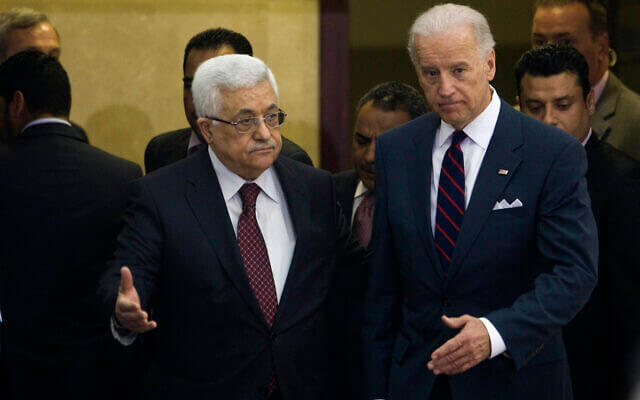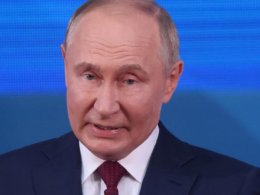Senior officials in the Palestinian Authority were angered by US President Joe Biden’s assertion on Wednesday that achieving a two-state solution will not be possible in the foreseeable future, with Ramallah arguing that such declarations complicate efforts to build a diplomatic horizon needed for an eventual peace deal.
In remarks at his official welcome ceremony at Ben Gurion Airport, Biden said he’d raise his “continued support — even though I know it’s not [feasible] in the near term — [for] a two-state solution.
“That remains, in my view, the best way to ensure the future of equal measure of freedom, prosperity and democracy for Israelis and Palestinians alike,” the president added, in his only reference to the Palestinian issue in his five-minute speech.
A PA minister and a Palestinian ambassador abroad both expressed their frustration Thursday over the caveat, with the former calling it “self-defeating” and the latter arguing that it was representative of an American administration that is not committed enough to the Palestinian cause. They both spoke on condition of anonymity, in an apparent exercise of caution ahead of Biden’s Friday meeting with PA President Mahmoud Abbas in Bethlehem.
“This is not the kind of statement we want to hear from President Biden, especially on the eve of his meeting with our president,” the PA minister said.
“It used to be that the American [talking point] was support for a two-state solution. This administration has changed it to ‘support for a two-state solution, which is not currently possible,'” the minister continued. “This is a deterioration of the status quo.”
The Palestinian ambassador lamented that Biden’s caveat regarding the feasibility of the two-state solution was consistent with his overall policy vis-à-vis the Palestinians, in which he prefers to focus on economic issues rather than political ones.
The envoy pointed to the decision by a senior Biden official on Wednesday to highlight a plan to roll out access to 4G cellular networks for Palestinians in the West Bank and Gaza Strip by the end of 2023.
“The fact that this is the central item of their package is indicative of how they see this issue,” the Palestinian ambassador added.
A source familiar with the matter said there are also talks with the US to issue a joint statement regarding the Israeli-Palestinian conflict during Biden’s meeting with Abbas but that Washington is not willing to go as far as the PA would like regarding the Palestinian connection to East Jerusalem, which they view as the capital of their future state.
Biden did drop the caveat during his public remarks after meeting with Prime Minister Yair Lapid on Thursday, saying the two-state solution was the “best way” to ensure Israel remains a Jewish, democratic state. He also noted the “deep and ancient roots” both peoples have “in this land” but was careful not to publicly criticize or press Israel, only saying that “any[thing] that takes us further from that outcome I believe would be very detrimental in the long term.”
And a day earlier, the senior US official said, “we’ve also been very clear… that we are not going to come out with a top-down peace plan.”
Biden is expected to speak out more clearly against unilateral measures, including Israeli settlement building, during his meeting with Abbas, a US official said.
But to Palestinians, significant damage was caused by the president’s first remark regarding the unlikelihood of a two-state solution in the “near term.”
“This was an analytical statement, not fitting for the president of the United States,” said Ibrahim Eid Dalalsha, who served as an adviser to the US consul general in Jerusalem and is currently the director of the Ramallah-based Horizon Center for Political Studies and Media Outreach.
“He is supposed to provide energy for the political efforts, but statements like this kill the momentum,” he said.
Dalalsha was also largely dismissive of the initiatives to strengthen the Palestinian economy that Biden is expected to announce on Friday. He noted that they are actually Israeli measures and that the US is spending much of its political capital pushing Jerusalem to advance them, rather than promoting steps of its own, such as the reopening of the PLO mission in Washington and revoking the 1987 Congressional law that classifies the PLO and its affiliates as terror organizations.
While Biden pledged to implement the former proposal during the campaign, implementing either idea would be both politically and legally challenging so long as the PA maintains its welfare program, which includes payments to security prisoners and the families of slain attackers.
The long-time US diplomat argued that Biden would have been better served leaving out the analysis and instead focusing on encouraging the parties to take practical steps toward a two-state solution, without separating the political and economic tracks.
“It’s not surprising that Palestinian officials are frustrated,” Dalalsha said. “A much more strategic level of engagement by the American president is needed.”










